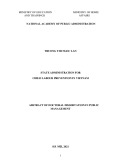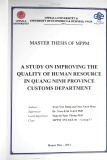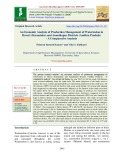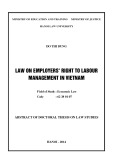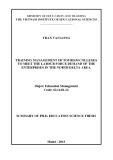
Labour management
-
This thesis is concerned, centrally, with the responses to NPM from two perspectives: local government and organised labour (specifically national and international trade union organisations). Two themes recur in the policy debates around NPM: the effects on the quality of public services and the impacts on employment. Both are examined in this thesis as they had been under-researched and were overshadowed in the research literature by an economistic concern with costs and technical efficiency.
 122p
122p  runthenight04
runthenight04
 02-02-2023
02-02-2023
 7
7
 2
2
 Download
Download
-
Research objectives: By examining theoretical and practical issues in state administration for child labour prevention, the dissertation proposes solutions to improving it.
 19p
19p  petsematary
petsematary
 06-06-2021
06-06-2021
 20
20
 2
2
 Download
Download
-
Beside the contribution to improve human resource quality in the customs department, the thesis still contains limitations: no analysis of the influence of factors such as inputs of human resource, facilities and working conditions, psychology of employees and influence of leaders.
 107p
107p  trananh2212
trananh2212
 26-09-2020
26-09-2020
 28
28
 3
3
 Download
Download
-
The present research entitled “An economic analysis of production management of watermelon in Haveri (Karnataka) and Ananthapur districts (Andhra Pradesh) - A comparative analysis” was carried out during the year 2017-18. For the study, 100 farmers were selected randomly from the study area. The main objectives of the study were to analyze the costs, returns and profitability of watermelon production in the study area. All the farmers (100%) in both the districts had sown seeds during rabi season and adopted drip irrigation for cultivating watermelon.
 13p
13p  gaocaolon5
gaocaolon5
 14-06-2020
14-06-2020
 21
21
 4
4
 Download
Download
-
Objectives of this thesis are to perform a comprehensive, in-depth and systematic study on some theoretical issues on employers' right to labor management. Based on studied theoretical basis, the thesis focuses on analyzing actual state of current law on employers' right to labor management. By evaluation of inadequate points in current laws, the thesis proposes amendments and supplementations of some provisions on employers' right to labor management in Vietnam appropriate to labor market development in the context of regional and international integration.
 28p
28p  change05
change05
 14-06-2016
14-06-2016
 82
82
 5
5
 Download
Download
-
Research objectives: Based on theory and practice of training and training management, the author proposed some solutions to training management of Tourism Colleges in order to improve the quality and efficiency to meet the labour force demand of enterprises in the North Delta Area in the new conditions.
 27p
27p  change03
change03
 06-05-2016
06-05-2016
 64
64
 8
8
 Download
Download
-
Ongoing Labour-Management Dialogue / Đốithoạithườngxuyêngiữangườilaođộngvàngườisửdụnglaođộng Regular Meetings / Cáccuộchọpthườngxuyên Consensus-based Decision-making/ Đưaraquyếtđịnhdựatrêncơsởđồngthuận Rotating Chair (Union and Management)/ Thayphiênchủtrì(côngđoànvàquảnlý) Agenda and Minutes/ Chươngtrìnhvàbiênbản Lots of 2-way communication tools/ Sửdụngcôngcụthôngtin haichiều
 6p
6p  bacsiquaidi123
bacsiquaidi123
 19-07-2010
19-07-2010
 74
74
 6
6
 Download
Download
CHỦ ĐỀ BẠN MUỐN TÌM










